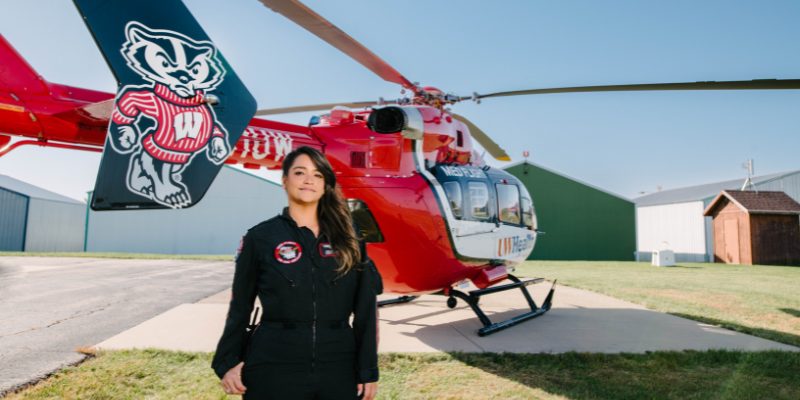By Shayna Mace | Photography by Hillary Schave
During her college years at Virginia Polytechnic Institute and State University, Cynthia Griffin answered an ad seeking people who were interested in training to be emergency medical technicians (EMTs). From there, it kicked off her journey of assisting people in precarious medical situations.
Griffin is a doctor of osteopathy (DO) and for the last ten years, has been a doctor with UW Health Med Flight. (She’s also a clinical assistant professor at the University of Wisconsin School of Medicine and Public Health.) While completing her emergency medicine residency at Virginia Commonwealth University Medical Center, a few of her supervisors suggested she look into becoming a helicopter physician after observing her during patient transports.
“They said, ‘Cynthia, we’ve never seen anyone as happy as you were when you did your helicopter flights … have you ever thought about being a helicopter physician?’ So I Googled ‘physicians in flight’ and found the program at UW.”
The UW Health Med Flight fellowship in Retrieval, Critical Care Transport and Helicopter EMS is the only program of its kind in the U.S. Once Griffin started the fellowship, she knew she was in exactly the right place.
“Emergency medical services are my first love. I loved working as a paramedic. But I wanted to do more, learn more, work outside of the box and be the one in charge. It was the best of all of the training I’ve ever had,” she explains.
UW Health’s Med Flight program is unique, with its website noting that it’s “the only air medicine program in the upper Midwest to fly with a physician routinely on board.” (Griffin says most other med flight programs have a pilot and critical care trained nurse on board; UW’s is staffed with all three.)
Emergency air transport is typically called in for motorcycle, car and farm accidents, as well as heart attacks, brain bleeds and time-critical emergencies. Griffin thrives during these situations that many of us would find extremely difficult.
“I’m human, so I get anxious sometimes, and you hear a bad call [come in] and you think, ‘Oh, this is going to be bad.’ So I just center myself. I always think, ‘trust your training’ — I’ve trained for 20 years to do this. It’s really challenging … but it’s what I love to do; I’m passionate about it.”





Comments are closed.